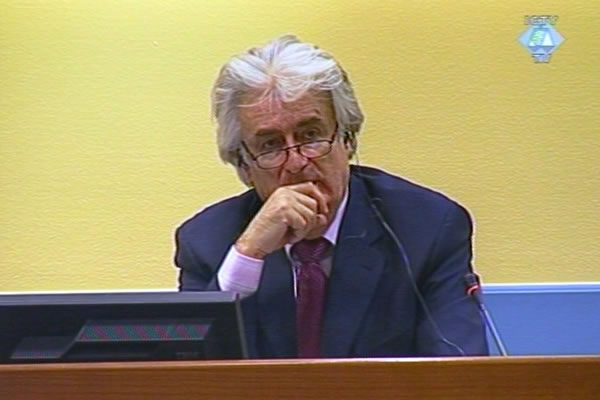Home
ZVORNIK ALMOST BECAME ‘ZUCO’S TOWN’
The trial of Radovan Karadzic resumed today with the testimony of a Serb police officer from Zvornik. The witness claims that the local authorities were unable to deal with volunteer groups. Rogue volunteers became so powerful that Zvornik was almost renamed ‘Zuco’s town’, the witness contends
 Radovan Karadzic in the courtroom
Radovan Karadzic in the courtroom The trial of former Republika Srpska president Radovan Karadzic resumed after the summer recess with the evidence of a Serb police officer from Zvornik. The witness testifies with image and voice distortion as protective measures. He noted that this was the fifth time he testified before the judges in The Hague.
The prosecution planned to tender into evidence the witness’s written statement based on his previous evidence and on the statements he had given to the OTP investigators. However, as the witness said that only parts ‘of interest’ to the prosecution were included in the statement, the Trial Chamber decided to hear the witness viva voce.
In July 2011, the witness read his consolidated statement and signed it, confirming its accuracy. Today, the witness claimed that in his previous statements he had said some things about Karadzic believing that there had been an agreement between Karadzic and Holbrooke. The witness thought that Karadzic would never be brought before the Tribunal. ‘We thought that it could help us and that it wouldn’t harm him’, the witness clarified.
In parts of the hearing open to the public the witness said the main reason why he joined the SDS was to keep Yugoslavia together. The need to ‘protect himself and his family’ and make sure that his family could remain in the house where they lived was an additional motive.
The witness confirmed that in late December 1991 he attended an extended meeting of the SDS Main Board in the Holiday Inn Hotel in Sarajevo. The witness was shown the copy of the instruction known as Variant A and B in Zvornik several days after the Sarajevo meeting. The instruction ‘worked out in detail the actions to be taken in a crisis situation’ in the municipalities where Serbs lived. Some parts of the document were later implemented because they were accepted as ‘good ideas’, the witness said.
According to the witness, Zeljko Raznatovic Arkan ordered the attack on Zvornik in April 1992. About a hundred other volunteers participated in the attack side by side with Arkan’s men. Among them were volunteers belonging to the men called Niski and Pivarski, the White Eagles, Zuco’s men and Gogic’s group. The witness confirmed his previous claims that the Crisis Staff invited, gathered and paid the volunteers, who later went rogue and turned into ‘paramilitaries’, the witness explained.
Zuco’s men became so powerful that at one moment they demanded from the local authorities to change the name of the town of Zvornik into ‘Zuco’s town’, the witness explained. The witness described the president of the Crisis Staff as a ‘martyr’; the volunteers took him away several times, wanting to execute him. From the time when Arkan left Zvornik until Zuco’s men were finally arrested in July 1992, they were ‘the strongest force’ in Zvornik and they did as they pleased. The local Serbs supported them, the witness said, because Zuco’s men kept spreading ‘negative propaganda’ about the local authorities, claiming they were ‘stealing and selling Muslims for money’.
The witness continues his evidence tomorrow.
